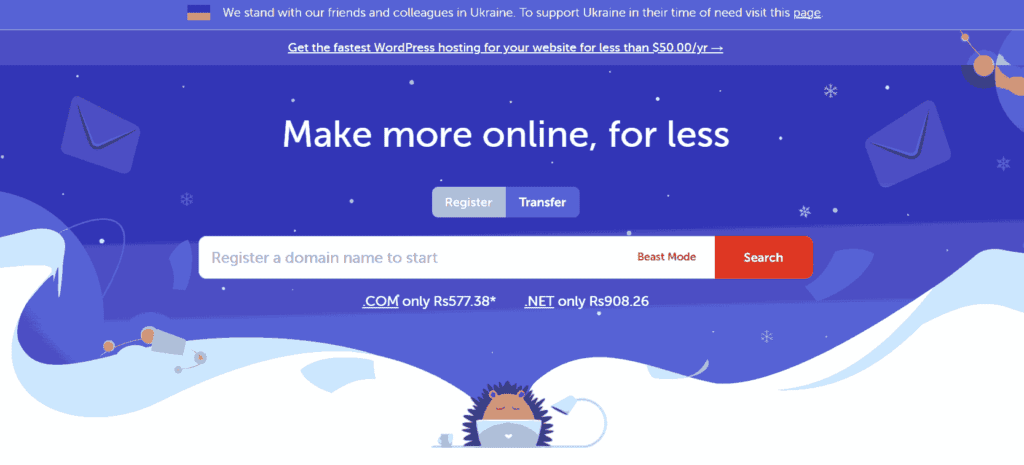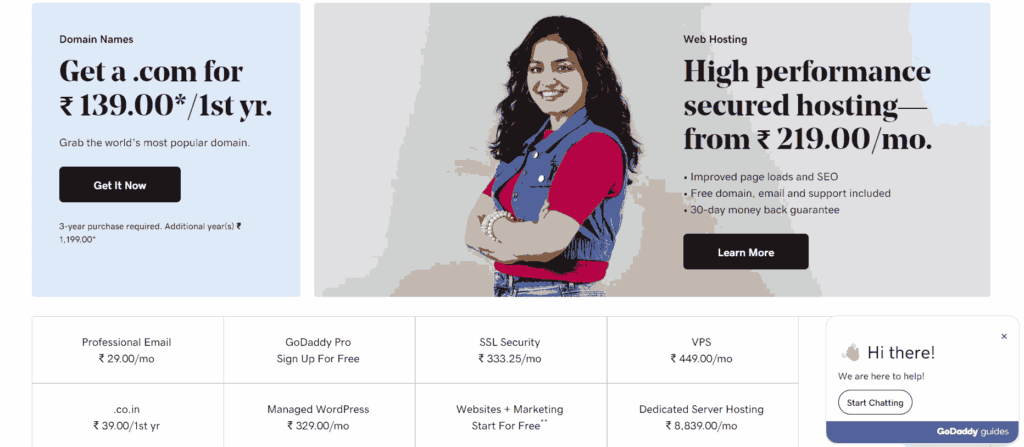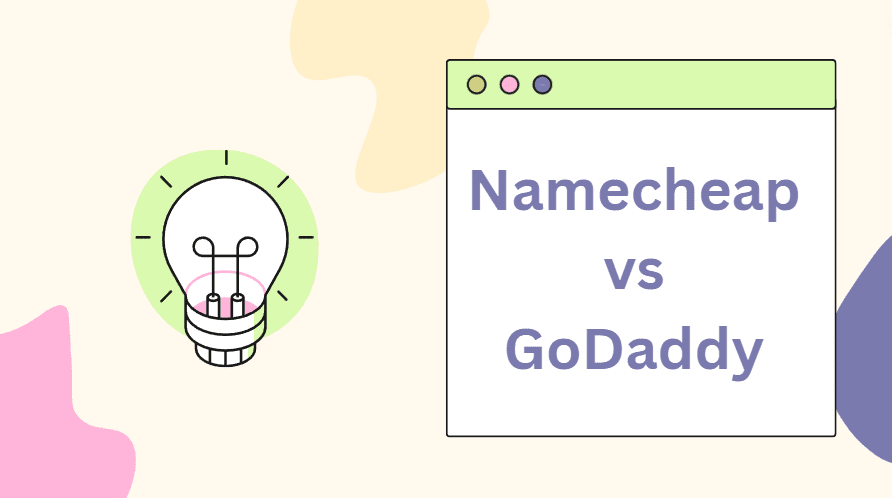Web hosting companies are widely available in the current market, which is both good and bad. It’s good because you have a lot of options and choices. It’s bad because comparing all of those options without losing your mind is extremely difficult. We can assist you by comparing Namecheap and GoDaddy.
Head-to-head Namecheap Vs GoDaddy web hosting comparison examines key features such as performance, pricing, pros and cons, and more – to help you decide before signing up with one of these domain name registrars that also provide web hosting services.
GoDaddy and Namecheap are the world’s leading domain name registrars, but they also provide web hosting.
Namecheap lives up to its name by providing a variety of low-cost pricing options. Namecheap, unlike some of its competitors, does not bombard you with upselling options, which we greatly appreciate. It simply works hard to provide you with a plethora of desirable features at a reasonable price. During the free trial period, you can test out Namecheap.
Godaddy is one of the most well-known web hosting services, giving it brand recognition that many of its competitors envy. GoDaddy’s prices are reasonable, and its features are simple to use, making it an excellent choice for beginners. You can begin using GoDaddy for free and begin searching for domain names.
Namecheap vs GoDaddy
Of course, you want your web hosting service to do the basics well. However, the features it provides beyond the basics may be the key to it perfectly fitting your needs. It becomes even more valuable when your service provider can solve problems that are unique to your business and website. Namecheap and GoDaddy can both assist you in a variety of ways.
Highlights from Namecheap
Maintaining a website’s availability is crucial to the success of any business online. The possibility of occurrence of reliability issues is ruled out. Namecheap guarantees your site won’t go down at any time. Namecheap offers a guarantee that if your site goes down at any point during the month, you will receive a full refund.
If you already have a website, you might be hesitant to move it to Namecheap due to the potential difficulties involved. However, Namecheap offers assistance in making the switch from your current hosting provider. Furthermore, it doesn’t cost you anything to make the change.

Namecheap provides a basic plan at an affordable price without reducing the number or quality of the services it provides, making it an attractive option for companies that operate on a limited budget for their websites. In addition, you can make use of the money-back guarantee that Namecheap provides for a period of thirty days, which means that there is no monetary risk involved in giving it a try.
Highlights from GoDaddy
It is not sufficient to merely have a well-known brand name in order to ensure that you will have a high-quality experience. GoDaddy, fortunately, provides quite a few key features for its customers, beginning with an interface that is simple to use. These features solve problems and deliver results for customers. Beginners won’t have a hard time putting together a website that looks professional in a short period of time at all.
In comparison to GoDaddy’s competitors, contacting the company’s customer service team is not too difficult to do in the event that you experience any difficulties while constructing your site with GoDaddy. There is a live phone support option available to you 24/7 through GoDaddy.

As soon as your website is live and accepting visitors, you want to ensure that it provides a high level of performance and is quick to respond to their needs. GoDaddy provides its customers with data centres located all over the world, which results in excellent load times for the users of your website. The rate at which the GoDaddy website loads from a variety of geographic locations consistently ranks among the best in the market for website hosting.
Pros and Cons: Namecheap vs GoDaddy
We have a profound comprehension of the industry that is comprised of web hosting service providers. Constantly conducting research into these companies, we look for both the positive and negative aspects that they offer. Through our research, we were able to identify a number of areas in which GoDaddy and Namecheap excel and a number of other areas in which they fall short.
Pros of Namecheap:
- Price: Because there is so much competition among web hosting companies, pricing is getting more competitive all the time, which is good news for you as an end user. Namecheap, on the other hand, offers a pricing structure that is particularly attractive. Even the company’s most basic package comes with a surprising number of features, giving it an advantage over its rivals. In addition, although there is an increase in price after the initial period, it is not as significant as the increase in price that is offered by its competitors. This is one area in which Namecheap excels beyond that of its competitor GoDaddy.
- Easy to use: Namecheap simplifies the process of starting a website from scratch or moving it from one host to another, depending on whether you need to transfer it from an existing host or not. The transfer of your website from another host to Namecheap is completely free of charge. When you want to launch a brand-new website, you have access to a number of help documents and tutorials that will lead you through the stages of constructing your very first website. Namecheap provides you with a selection of different templates as well. You will have a website that looks professional in almost no time at all, and you will be able to modify it in the future as your requirements shift.
- Versatile hosting plans: Shared hosting is the foundation of Namecheap’s more budget-friendly plan options. However, if you are interested in exploring other possibilities for hosting your website, NameCheap has you covered in this regard as well. As a customer of Namecheap, you have the option of choosing between WordPress hosting, reseller hosting, VPS hosting, and dedicated hosting.
- Free add-ons: Namecheap outperforms GoDaddy for the pricing on its add-on and extra features, too. With Namecheap, you will receive a WHOIS privacy package and one email account tied to your website for free. GoDaddy charges you for both of these items on a monthly or annual basis. This is just more evidence that Namecheap delivers a pricing structure that will save you quite a bit of money versus what GoDaddy will charge you for similar features and services.
- History: It isn’t always simple to subscribe to a company that has a significant history of success in a market that appears to be oversaturated with website hosting providers. Namecheap is a domain registrar that was established more than twenty years ago, making it one of the companies in this industry with one of the longest histories. Along the way, it added a variety of other features and services. You can have confidence in Namecheap’s reliability and stability as a web hosting provider because it has more than 11 million domain names registered under its customers’ names.
Areas of Namecheap need to be improved(Cons):
- Security: Namecheap is lacking in a few areas that are concerning, despite the fact that it does have some security features that are desirable. Namecheap offers free SSL certificates that visitors to your website can use to verify that your website is legitimate. You will be responsible for performing these functions on your own, which is something that novices may find difficult to do. However, it does not monitor your server and website for malicious software or viruses.
- Customer support: If you are using Namecheap and run into straightforward issues, you should be able to locate the answer to your problem within the service’s help documentation or through a chatbot session. Namecheap’s customer service responsiveness, on the other hand, will decrease as the level of difficulty of your problems rises. Namecheap does not provide a telephone support option for customers, in contrast to GoDaddy, which provides customer service over the phone around the clock. It’s possible that Namecheap won’t be able to help you find a solution to a difficult problem in a timely manner.
- Simple website building tools: Namecheap does an excellent job of providing customers with basic features at an affordable price, but the company has difficulty meeting the requirements of customers who require more advanced services. This is especially noticeable when you are building your site, as Namecheap only provides a simple app and pre-made templates to assist you in creating your site. Namecheap will not meet your expectations if you require a website with more advanced capabilities than its standard offering.
Pros of GoDaddy:
- Brand trust: You do not need to be concerned about GoDaddy suddenly disappearing from the competitive landscape of web hosting. It was founded in 1997, and in the years that followed, it grew to become the most successful domain registrar. It has continued to maintain one of the most popular brand names in the sector, and it currently has approximately 60 million domain names registered under its name.
- Easy to use: GoDaddy simplifies and streamlines the process of launching and maintaining a website in every conceivable way. One of the reasons for GoDaddy’s immense popularity is that the website builder makes it relatively simple for inexperienced users to produce a site that is both aesthetically pleasing and reliable. Additionally, GoDaddy permits the installation of applications developed by other companies, which results in increased functionality. These applications can be installed with just one click, which will help you save time. Although both GoDaddy and Namecheap are simple to use, GoDaddy is marginally more intuitive than Namecheap in this regard.
- Introductory price: In the first year or two of operation, it is common practise for web hosting services to offer discounted prices in order to attract new customers. If you sign up for GoDaddy’s hosting service, you can take advantage of GoDaddy’s excellent introductory pricing, which includes the possibility of obtaining a free domain for the first year of your subscription.
In the event that you decide to purchase a really pricey domain, the amount of money you save in the first year could be quite substantial. You should be aware that beginning with the second year of registration, the full cost of the domain will be deducted from your account.
- Multiple hosting plans: GoDaddy, much like Namecheap, provides you with a comprehensive menu of choices to meet all of your hosting requirements. You have the option of selecting shared hosting, hosting for WordPress, hosting for businesses, virtual private server hosting, or dedicated hosting. You are able to switch from one hosting service to another within the GoDaddy umbrella if the requirements of your website change as a result of your growing business.
- Customer support: GoDaddy’s excellent customer service options are another reason for the company’s popularity among individuals who are just beginning their web design careers. In this respect, GoDaddy is a significantly superior alternative to Namecheap. Simply the fact that GoDaddy provides options for 24/7 telephone support service that is impressive enough. However, GoDaddy also provides a large number of options for self-help materials, such as tutorials, blog posts with step-by-step instructions, videos, and chatbots that can deliver the answers you require whenever you require them.
- Unlimited bandwidth: Even if you are using one of the more affordable pricing tiers for your hosted website with GoDaddy, you will still have access to unlimited bandwidth. Sites that receive a significant amount of visitors stand to benefit from this feature.
The majority of people who visit your website will experience quick loading times thanks to the strategic placement of GoDaddy’s data centres across the globe in countries including the United States, Europe, Asia, and India. This enables you to make the most of the bandwidth that is available to you, which is unlimited.
Areas of GoDaddy needs to be improved(cons):
- Price jumps: When the introductory period that you have with GoDaddy comes to an end, you may experience some “sticker shock” regarding the standard prices that you will be charged going forward. Every web hosting service that offers introductory pricing raises the prices pretty significantly in year two and beyond; however, GoDaddy’s price increases are greater than average in comparison to other web hosting services.
- Upselling: GoDaddy may irritate you if you dislike receiving constant requests from your service providers to purchase add-ons or migrate to a higher-priced service tier. GoDaddy begins suggesting upsells when you sign up for your account and continues after you become a full-fledged customer.
GoDaddy will sometimes add extras to your cart based on your responses to questions without your permission. It can almost feel like you have to stop every few minutes to check your shopping cart for items you didn’t order in order to avoid making unnecessary purchases. Namecheap does not engage in such upselling tactics.
- Add on charges on basic items: Unfortunately, those upsells may be required to meet your website’s needs because GoDaddy does not include some basic items as part of your subscription price. GoDaddy, for example, charges extra for WHOIS privacy, site-specific email accounts, and an SSL certificate. Namecheap provides these items as part of your subscription more frequently than GoDaddy. When the items aren’t included in the subscription, Namecheap charges far less than GoDaddy.
Bottom Line
GoDaddy and Namecheap compete with other web hosting providers in a highly competitive market. Both offer competitive pricing in comparison to their competitors and are among the longest-running hosting service providers.
Those who use GoDaddy appreciate how simple it is to use; even beginners can get started quickly. GoDaddy has reasonable introductory prices, but after the intro period ends, the prices skyrocket.
Namecheap maintains its highly desirable price points in comparison to competitors at the time of signup and in the future. However, it sacrifices customer support performance in order to provide you with below-average pricing options.
